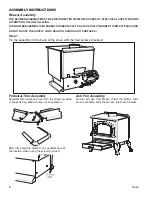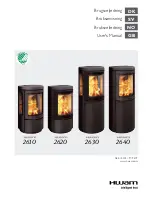
1
Saltfire ST2, ST4
INSTALLATION AND OPERATING INSTRUCTIONS.
INTRODUCTION
SAFETY
Safety is the most important consideration when using and installing your stove. If not installed and used
correctly, a house fire could result. Installation must comply with relevant national and local Building
Regulations and fire safety standards.
IN THE EVENT OF CHIMNEY FIRE, EVACUATE THE PROPERTY AND CALL THE EMERGENCY SERVICES.
Your stove will be heavy, and care needs to be taken when lifting - 2 people will normally be required to lift.
UNPACKING
Your stove will have several of its components stored inside the stove itself for transportation.
Do NOT drag the stove on its legs
–
it must be carefully lifted into place.
You will also find a glove which must be used when opening the door or when adjusting air vents when the
fire is hot.
INSTALLATION
Installation of your stove must comply with relevant local and national Building Regulations and fire safety
standards.
































